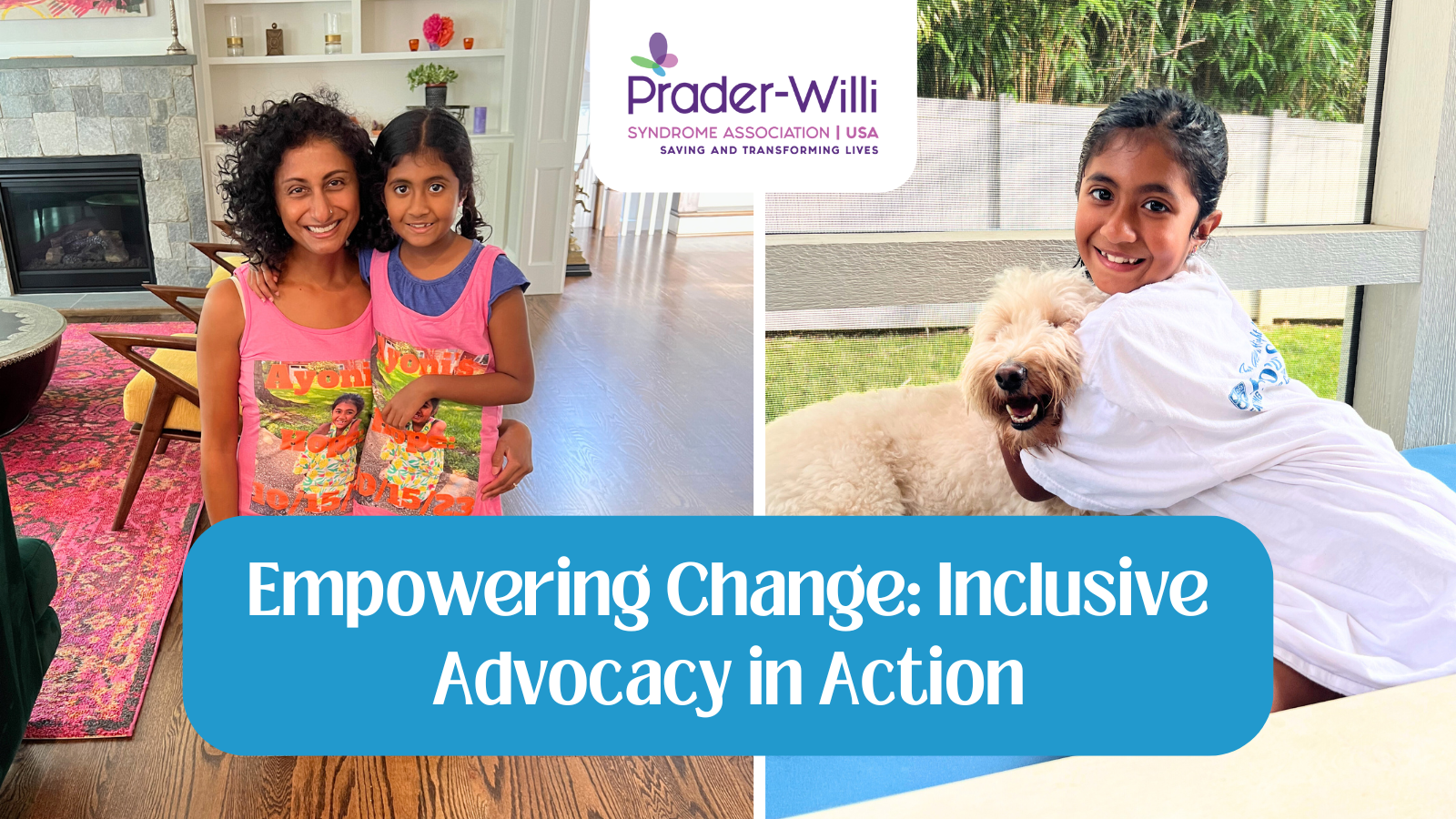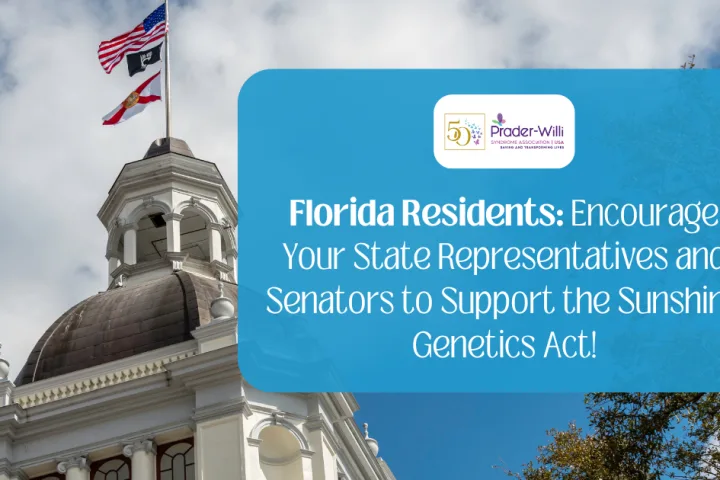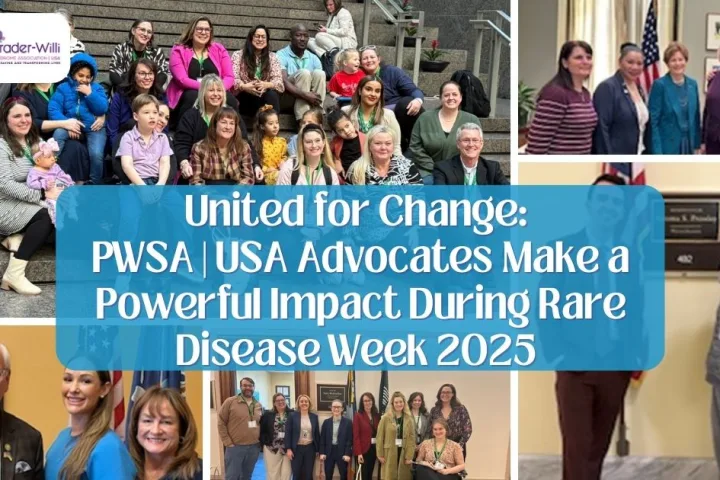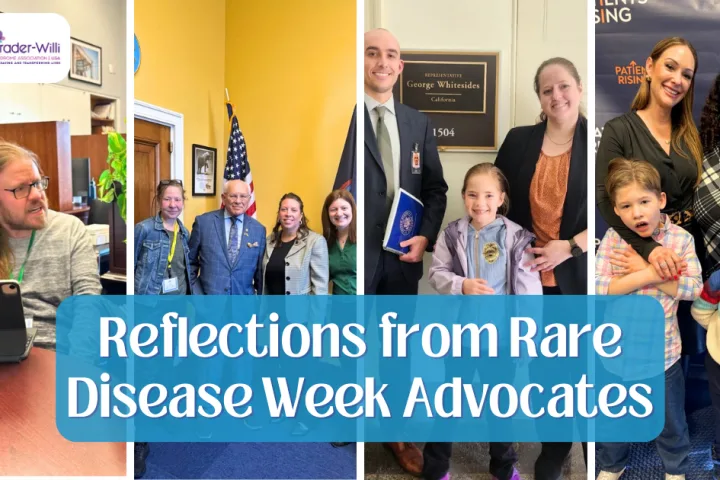Advocating for individuals with Prader-Willi syndrome (PWS) means embracing every voice and every story. At PWSA | USA, we believe that expanding diversity efforts is essential to ensure every family feels seen, heard, supported, and receives their PWS diagnosis as early as possible.
The Power of Inclusion
For Dorothea Lantz, Director of Community Engagement at PWSA | USA and mother to Hunter, who is living with PWS, the urgency of inclusive advocacy is deeply personal.
“Something that has disturbed me, especially for the past several years as I’ve been entrenched in this community and the advocacy community, is what happens to those families who are overlooked. What happens to those individuals who have PWS, who aren’t getting the diagnosis until they’re two, three, five, 13? What good is the advocacy work that we’re doing to encourage pharmaceutical intervention at an early age and physical therapies, occupational therapy, speech therapy, or any type of early intervention? I’m really excited that we’ve had some amazing, brave individuals step up to lead the charge. To have people who are part of our community who are willing to stand up and share their voices and experiences as people of color has moved me in a way that I never expected.”
Dorothea’s reflection speaks to a vital need: ensuring no family feels left behind, especially those from historically underserved communities.
Dini Rao: Helping Lead the Charge
One of the individuals leading this charge is Dini Rao, mom to Ayoni, an 8-year-old living with PWS, and co-founder of the newly formed PWS BIPOC Affinity Group (Black, Indigenous, and People of Color). For Dini, her daughter’s late PWS diagnosis sparked a passion for advocacy and the determination to build a more inclusive and supportive space for families like hers.
Dini recently put this mission into action at PWSA | USA’s 2024 D.C. Fly-In, where she advocated alongside other rare disease families.
“It was absolutely empowering. Being in D.C. and being able to advocate for my family, but also all rare disease families and all those living with rare diseases, really for the first time it was like—here in this helpless situation where so many things are coming at you and out of your control—finally, here’s something I can do. Something that is proactive, that feels positive.”
But Dini’s advocacy began well before the 2024 Fly-In. Through connections made at a PWSA | USA conference, she discovered a shared determination among families of color to address the unique challenges they face. That momentum led to the creation of the BIPOC Affinity Group.
“A few of us, actually at the Florida PWSA conference, looked at each other and were all kind of like, oh, wow, I don’t see too many other folks of color at these conferences. So, we kind of just naturally had an affinity for one another and started sitting at tables together. Then, we started asking questions during the panels. I asked the question, ‘How are you diversifying clinical trials?’ and things like that. I got together with a little group—the Conway’s, Gen and Charles, and Karine from Canada—and the four of us decided that we’ll be organizers of this and take the helm, hopefully inviting in more people as things evolve. What we really wanted to do was tackle the issues that BIPOC communities specifically face. It’s really nice to have this place where we’re supporting each other and listening to one another. Then, in turn, we take what we’re hearing and partner with PWSA to say, ‘Here’s what the community’s needs are, and how can we work together to come up with real solutions for all this?’”
Creating a Platform for All
Through efforts like the BIPOC Affinity Group and events like the D.C. Fly-In, PWSA | USA continues to address disparities, educate medical professionals, and ensure every family—regardless of background—has access to the support they need.
Dorothea underscores the importance of raising awareness of these unique challenges:
“I think that the first challenge we have, and one of the first things that will be addressed by the BIPOC Affinity Group, is just bringing awareness to the unique challenges faced by different communities and communities of color.”
For Dini, the ripple effect of inclusive advocacy is far-reaching:
“What ends up happening is you don’t just help the people of color, but it ends up creating a much more inclusive language and method of advocacy. It takes in people with different disabilities, and people of different gender and sexual preferences so that all of a sudden, we really have an advocacy platform that stands for everybody, and we aren’t leaving anybody behind. That’s the real power of this.”
Hope in Action
Dini’s vision is a powerful reminder of what’s possible when every voice has a seat at the table. Inclusive advocacy ensures no family walks this journey alone, and that every individual with PWS has access to the resources they deserve.
Your support of PWSA | USA’s Angel Drive makes this vision a reality. As Dini shares:
“It gives me goosebumps that people are willing to put their heart and their hard-earned money into organizations that affect so many people. So much good comes out of this. It takes something that feels like an otherwise unlivable situation—sometimes I’m in it—and makes it doable. It makes it even joyful at times. So, I don’t know what else could be more important.”
By supporting PWSA | USA’s 2024 Angel Drive Campaign, you are helping to turn hope into action—ensuring a stronger, more inclusive, and united PWS community.
Share this!





 Jennifer Bolander has been serving as a Special Education Specialist for PWSA (USA) since October of 2015. She is a graduate of John Carroll University and lives in Ohio with her husband Brad and daughters Kate (17), and Sophia (13) who was born with PWS.
Jennifer Bolander has been serving as a Special Education Specialist for PWSA (USA) since October of 2015. She is a graduate of John Carroll University and lives in Ohio with her husband Brad and daughters Kate (17), and Sophia (13) who was born with PWS. Perry A. Zirkel has written more than 1,500 publications on various aspects of school law, with an emphasis on legal issues in special education. He writes a regular column for NAESP’s Principal magazine and NASP’s Communiqué newsletter, and he did so previously for Phi Delta Kappan and Teaching Exceptional Children.
Perry A. Zirkel has written more than 1,500 publications on various aspects of school law, with an emphasis on legal issues in special education. He writes a regular column for NAESP’s Principal magazine and NASP’s Communiqué newsletter, and he did so previously for Phi Delta Kappan and Teaching Exceptional Children. Evan has worked with the Prader-Willi Syndrome Association (USA) since 2007 primarily as a Crisis Intervention and Family Support Counselor. Evans works with parents and schools to foster strong collaborative relationships and appropriate educational environments for students with PWS.
Evan has worked with the Prader-Willi Syndrome Association (USA) since 2007 primarily as a Crisis Intervention and Family Support Counselor. Evans works with parents and schools to foster strong collaborative relationships and appropriate educational environments for students with PWS. Dr. Amy McTighe is the PWS Program Manager and Inpatient Teacher at the Center for Prader-Willi Syndrome at the Children’s Institute of Pittsburgh. She graduated from Duquesne University receiving her Bachelor’s and Master’s degree in Education with a focus on elementary education, special education, and language arts.
Dr. Amy McTighe is the PWS Program Manager and Inpatient Teacher at the Center for Prader-Willi Syndrome at the Children’s Institute of Pittsburgh. She graduated from Duquesne University receiving her Bachelor’s and Master’s degree in Education with a focus on elementary education, special education, and language arts. Staci Zimmerman works for Prader-Willi Syndrome Association of Colorado as an Individualized Education Program (IEP) consultant. Staci collaborates with the PWS multi-disciplinary clinic at the Children’s Hospital in Denver supporting families and school districts around the United States with their child’s Individual Educational Plan.
Staci Zimmerman works for Prader-Willi Syndrome Association of Colorado as an Individualized Education Program (IEP) consultant. Staci collaborates with the PWS multi-disciplinary clinic at the Children’s Hospital in Denver supporting families and school districts around the United States with their child’s Individual Educational Plan. Founded in 2001, SDLC is a non-profit legal services organization dedicated to protecting and advancing the legal rights of people with disabilities throughout the South. It partners with the Southern Poverty Law Center, Protection and Advocacy (P&A) programs, Legal Services Corporations (LSC) and disability organizations on major, systemic disability rights issues involving the Individuals with Disabilities Education Act (IDEA), Americans with Disabilities Act (ADA), and the federal Medicaid Act. Recently in November 2014, Jim retired.
Founded in 2001, SDLC is a non-profit legal services organization dedicated to protecting and advancing the legal rights of people with disabilities throughout the South. It partners with the Southern Poverty Law Center, Protection and Advocacy (P&A) programs, Legal Services Corporations (LSC) and disability organizations on major, systemic disability rights issues involving the Individuals with Disabilities Education Act (IDEA), Americans with Disabilities Act (ADA), and the federal Medicaid Act. Recently in November 2014, Jim retired.